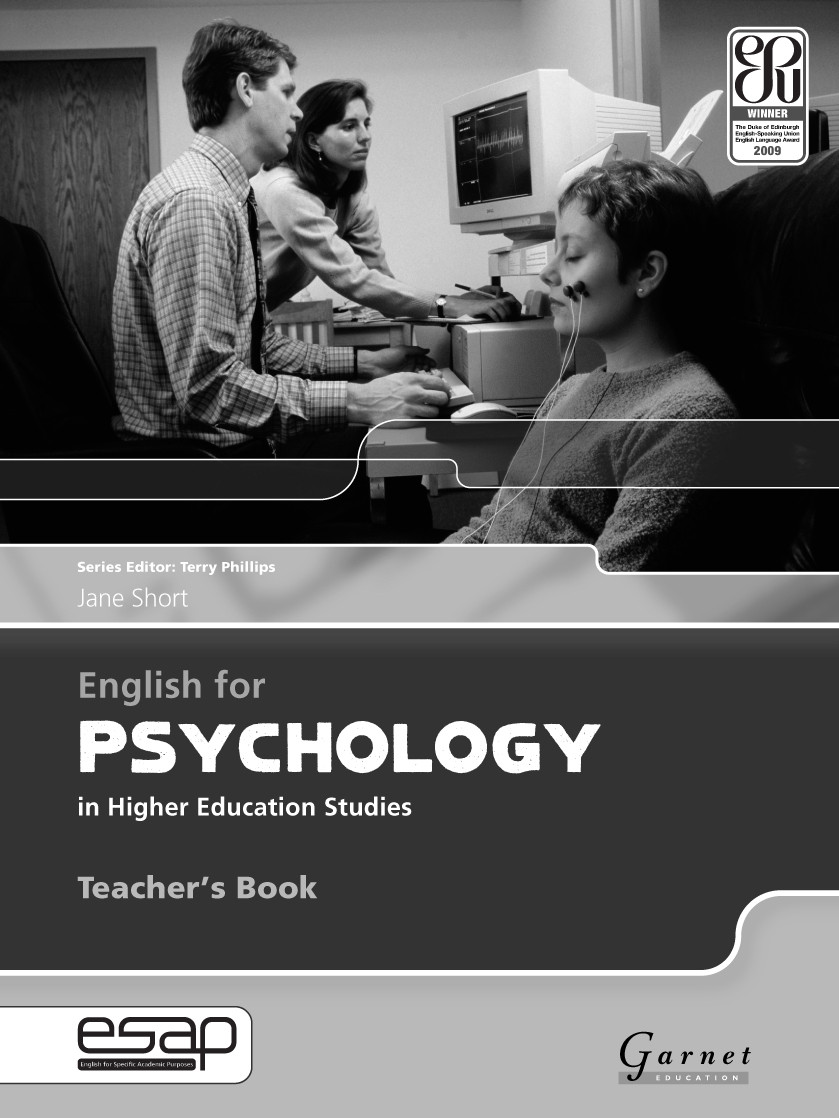About the book
English for Psychology in Higher Education Studies
The Garnet Education English for Specific Academic Purposes series won the Duke of Edinburgh English Speaking Union English Language Book Award in 2009.
English for Psychology is a skills-based course designed specifically for students of psychology who are about to enter English-medium tertiary level studies. It provides carefully graded practice and progression in the key academic skills that all students need, such as listening to lectures and speaking in seminars. It also equips students with the specialist language they need to participate successfully within a psychology faculty. Extensive listening exercises come from psychology lectures, and all reading texts are taken from the same field of study. There is also a focus throughout on the key psychology vocabulary that students will need.
The Teacher’s Book includes:
- Comprehensive teaching notes on all exercises to help teachers prepare effective lessons
- Complete answer keys to all exercises
- Full transcripts of listening exercises
- Facsimiles of Course Book pages at the appropriate point in each unit
- Photocopiable resource pages and ideas for additional activities
The Garnet English for Specific Academic Purposes series covers a range of academic subjects. All titles present the same skills and vocabulary points. Teachers can therefore deal with a range of ESAP courses at the same time, knowing that each subject title will focus on the same key skills and follow the same structure.
Key Features
- Systematic approach to developing academic skills through relevant content.
- Focus on receptive skills (reading and listening) to activate productive skills (writing and speaking) in subject area.
- Eight-page units combine language and academic skills teaching.
- Vocabulary and academic skills bank in each unit for reference and revision.
- Audio CDs for further self-study or homework.
- Ideal coursework for EAP teachers.
Contents
Unit 1: What is psychology?
Unit 2: Branches of psychology
Unit 3: Psychology in practice
Unit 4: Psychology and computers
Unit 5: Dreams and personality
Unit 6: Vygotsky and Piaget: thought and language
Unit 7: Memory
Unit 8: Mental disorders: popular myths
Unit 9: Personality
Unit 10: Modern addictions
Unit 11: Parapsychology
Unit 12: With the future in mind
Author details
Jane Short graduated in English from the University of Southampton, and started her career in English language teaching with VSO in Thailand. She has a PGCE from University College, London and an MA in TEFL from the University of Reading.
She lived in Venezuela for over 20 years, where she taught English in industry and business. Between 1997 and 2003, she also taught English literature and language teaching methodology at the Universidad Pedagógica El Libertador in Barquisimeto.
Since 2003, she has lectured in English for Academic Purposes at the University of Kent, where she is currently Director of In-sessional English language provision.
She is the author of the IELTS Graduation: Teacher’s Book and co-author of the IELTS Graduation: Study Skills Pack, published by Macmillan Education.
Jane has written the Psychology title in the award-winning ESAP series which was published in 2010.
Terry Phillips has worked in ELT for more than 35 years as a teacher, teaching supervisor, manager and language school owner. As a consultant, he has worked in more than 20 countries in all parts of the world, advising state and private language institutions on all aspects of school management.
For the last ten years, he has been a full time freelance writer with his wife Anna, producing more than 160 published books in ELT. Although he and Anna have worked for all the major publishers, all recent works have been for Garnet Education.
Terry is the series editor of the English for Specific Academic Purposes series for Garnet Education, which aims to prepare students to entry into a particular faculty for English-medium tertiary education. The series won the ESU award in 2009.
Reviews
"When Garnet Education’s ‘English for Specific Academic Purposes’ series won the English Speaking Union’s English Language book award in 2009, it was an indication that the provision of quality resources for EAP had entered a new era. Having seen how Garnet Education have raised the bar in terms of ESP course books, I approached the Psychology volume with high hopes. Once again, they have delivered the goods.
A very worthwhile addition to Garnet’s award-winning series of skills-based courses designed specifically for non-native students who are about to enter English-medium tertiary-level studies, perfectly pitched for its target audience.
The teacher’s book has clearly been given the same level of attention as the student’s book. Each unit receives the same degree of detail and one detail that I particularly like is that there is a snapshot of the pages from the student’s book in each unit. This is a small detail, but it makes it really easy for the teacher to orient themselves and see how the guidance given relates to the activities the students see in their book. Another nice touch is that the lexis is explained in terms of how it is specifically used in the field of psychology. The advice given is succinct but adequate, meaning that the teacher using this need not be an expert in psychology, nor even that experienced in delivering EAP courses. The teacher’s book also contains old standards, such as crosswords and word searches. While such things might not appeal to all, it is nice that they have been included so that the teacher has the chance to incorporate fun activities, or even just to offer a change of pace should they feel it necessary. Despite its comprehensive nature – it is almost twice the length of the student’s book – the teacher’s book manages to remain descriptive rather than prescriptive, with a lot of what is included simply being advice about how to approach teaching with the book.
All in all, any teacher should feel comfortable taking English for Psychology into an ESAP class, regardless of their level of experience in teaching specific academic courses."
- Adam Simpson for Teflnet, April 2012




